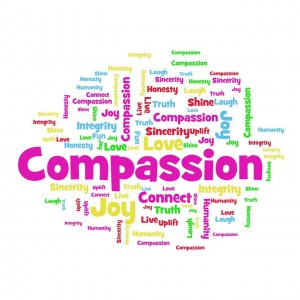Another powerful phase of moving forward on your healing journey is giving back. Your brain will develop wherever you place your attention, which is the essence of neuroplasticity. When your attention is focused on those around you, you’ll move a long ways from your pain circuits.
Empathy/ compassion
The Oxford dictionary defines empathy as, “the ability to understand and share the feelings of another.” It is a core component of nurturing human relationships. If you don’t have some sense of how someone close to you is feeling, you can’t interact with them in a meaningful way. You might as well be in another room. The capacity to feel empathy is an inherent part of the human experience because from an evolutionary perspective, it was the species of humans who learned to cooperate that had the highest likelihood of survival.
Compassion is the next step in healthy relationships that follows empathy. You first have to have the ability to see a situation through the other person’s eyes with an understanding of what it might be like to be in a similar circumstance. Compassion is a desire to help out. Nurturing compassion has two parts: 1) engaging in practices that engender empathy, and 2) removal of any interference connecting you with your own compassion.
The disconnect–anger
The problem is that when you are consumed with frustration and anger, it is only about you and it is not possible to be aware of others needs. So, the foundational step of empathy is compromised. You might feel you have empathy in spite of being upset. You do–when you are calm. But often people in pain are constantly frustrated and many of their relationships are based on bonding with other people who are angry. It seems like a close relationship with intimate conversations around suffering. But do you really know the person beneath the pain? It is a vicious cycle and one of the reasons why it is so important to never discuss your pain or medical care with anyone except your providers – ever!!
We all have a deep need to help those around us. But when you are angry, compassion goes right out the window. It is interference that needs to be dealt with before you can feel compassion and engage in helpful acts. You are then able to implement practices to increase your empathy–starting with awareness.
I’ve watched this Harvard commencement address given by J.K. Rowling in 2008 many times. It is one of the most inspiring speeches I have ever heard. She was determined to follow her own passion while at the same time remembering and honoring her past. I would encourage you to take the time to listen to it. In addition to being a highly acclaimed author, she is also a remarkable speaker.
Happy
Healing doesn’t entail “seeking happiness” at every step of the way. Life isn’t that way and challenges will never stop coming at you. Constructively dealing with adversity is essential. It is a learned skill to “be with your pain instead of fighting it. Eventually, many situations that seemed so impossible become much easier to deal with. You’ll be able to more easily pass through “The Ring of Fire”. As you de-energize your anger and connect with your empathy and compassion for others, happiness will emerge.
https://youtu.be/wHGqp8lz36c Brenda
Brenda
Patients freed of pain often want to give back—and in a big way. Barbara was a patient who became paraplegic from an unfortunate series of events surrounding spine surgery. Using the book, Forgive for Good made a tremendous impact on her outlook, mood, and pain. After she embraced true forgiveness, her overwhelming urge was to help others in wheelchairs who were suffering from chronic pain. She was happier in a wheelchair than she was walking, anxious, and angry. She then descended back into her Abyss of chronic pain for several years. I recently heard from her, and she had pulled herself back out. Once you’ve tasted true freedom, you’ll know how to return to it.
Nurturing Compassion
I have a few suggestions to consider, which might help you formulate your own ideas of how to give back.
- Remain committed to your own journey. You can’t help others if you are not doing well.
- Practice awareness. Remain aware of yours and other’s needs, listen carefully to others and try to see situations through their eyes.
- Don’t discuss your pain, complain, give unasked-for advice or be critical. Not of these are compassionate acts. It is a little harder than you might think, because all of us complain. It really isn’t that enjoyable.
- Your highest priority is your immediate family. Even if you’re in pain, treat them well.
- Make a random list of ideas of ways to give back that are interesting to you—write them down. They can be small actions.
- Pick the top five
- Prioritize them
- Pick one
- Develop a specific plan.
- Do it!!
- Pick the top five
- Create a vision of what you’d like your life to look like in one year and five years.
- Be as specific as possible.
- Learn organizational skills to implement your vision.
- Getting Things Done by David Allen
It’s easy to feel that J.K. Rowling was lucky; how can she not enjoy her life with the success she’s experienced? Luck is winning the lottery. We are all aware of high-profile public figures who spent their lives fighting addictions with many not surviving. What didn’t they possess? Their stories of self-destruction are legendary. J.K. Rowling didn’t have an easy start, but she continued to stay connected to her passion in spite of many obstacles. Giving back is a high priority for her. Staying connected to your vision with persistence is an important key to moving forward with or without your pain.
Listen to the 2012 Hoffman interview.
Listen to the Back in Control Radio podcast Giving Back.
